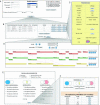MolliGen, a database dedicated to the comparative genomics of Mollicutes
- PMID: 14681420
- PMCID: PMC308848
- DOI: 10.1093/nar/gkh114
MolliGen, a database dedicated to the comparative genomics of Mollicutes
Abstract
Bacteria belonging to the class Mollicutes were among the first ones to be selected for complete genome sequencing because of the minimal size of their genomes and their pathogenicity for humans and a broad range of animals and plants. At this time six genome sequences have been publicly released (Mycoplasma genitalium, Mycoplasma pneumoniae, Ureaplasma urealyticum-parvum, Mycoplasma pulmonis, Mycoplasma penetrans and Mycoplasma gallisepticum) and as the number of available mollicute genomes increases, comparative genomics analysis within this model group of organisms becomes more and more instructive. However, such an analysis is difficult to carry out without a suitable platform gathering not only the original annotations but also relevant information available in public databases or obtained by applying common bioinformatics methods. With the aim of solving these difficulties, we have developed a web-accessible database named MolliGen (http://cbi.labri.fr/outils/molligen/). After selecting a set of genomes the user can launch various types of search based on annotation, position on the chromosomes or sequence similarity. In addition, relationships of putative orthology have been precomputed to allow differential genome queries. The results are presented in table format with multiple links to public databases and to bioinformatic analyses such as multiple alignments or BLAST search. Specific tools were also developed for the graphical visualization of the results, including a multi- genome browser for displaying dynamic pictures with clickable objects and for viewing relationships of precomputed similarity. MolliGen is designed to integrate all the complete genomes of mollicutes as they become available.
Figures

References
-
- Frey J. (2002) Mycoplasmas of animals. In Razin,R. and Herrmann,R. (eds), Molecular Biology and Pathogenicity of Mycoplasmas. Kluwer Academic/Plenum Publishers, London, pp. 73–90.
-
- Blanchard A. and Bébéar,C.M. (2002) Mycoplasmas of humans. In Razin,R. and Herrmann,R. (eds), Molecular Biology and Pathogenicity of Mycoplasmas. Kluwer Academic/Plenum Publishers, London, pp. 45–71.
-
- Bove J.M., Renaudin,J., Saillard,C., Foissac,X. and Garnier,M. (2003) Spiroplasma citri, a plant pathogenic mollicute: Relationships with its two hosts, the plant and the leafhopper vector. Annu. Rev. Phytopathol., 41, 483–500. - PubMed
-
- Hutchison C.A., Peterson,S.N., Gill,S.R., Cline,R.T., White,O., Fraser,C.M., Smith,H.O. and Venter,J.C. (1999) Global transposon mutagenesis and a minimal Mycoplasma genome. Science, 286, 2165–2169. - PubMed
Publication types
MeSH terms
LinkOut - more resources
Full Text Sources
Molecular Biology Databases
Research Materials

